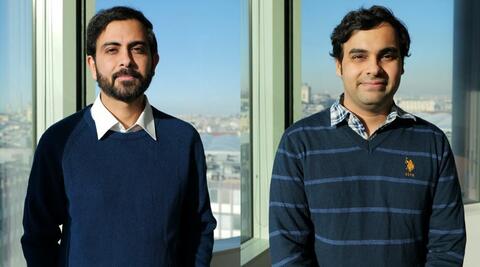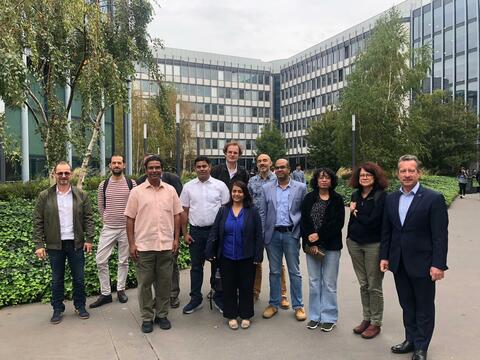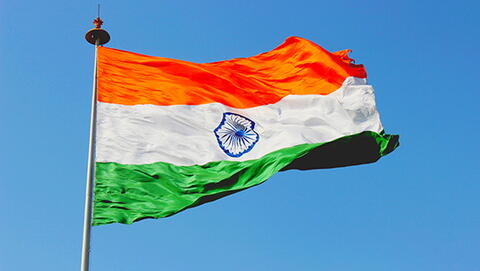
"It's about scaling up and diversifying our research focus, for the collective good."
Rahul Gupta (Pictured, right) and Dinesh Sharma (Pictured, left), PhD candidates at the Indian Institute of Technology Delhi (IITD) have spent the past three months on exchange at Sorbonne University. Here, we interview them about their experience.
Rahul specializes in Biochemical Engineering and Biotechnology with a focus on Cancer Biology, while Dinesh's expertise lies in the realm of computational biology. During their exchange programs, they have delved into diverse research, collaborative projects and cultural experiences.
Sorbonne University is proud to be partnering with IITD in our joint Franco-Indian Campus for Health, which was officially launched in 2023.
Tell us about your academic backgrounds.
Rahul Gupta: After both a Bachelor’s and Master’s of Technology, I am currently pursuing a PhD in Biochemical Engineering and Biotechnology at IITD, specializing in Cancer Biology. My thesis seeks to investigate the role of non-coding RNAs in genome instability in Glioblastoma (the most common malignant tumors in the adult brain.)
Dinesh Sharma: I specialize in computational biology. My Bachelor’s degree was in Biomedical Sciences and my Master’s in Bioinformatics. I am now in the midst of my PhD, focusing on the physio-chemical investigations of genome sequences and next-generation sequencing.
What inspired you to study at Sorbonne University?
RG: When I saw the advertisement for an exchange experience at Sorbonne University, I jumped at the chance. I joined Professor Ahmed Idbaih & Doctor Maite Verreault’s team at the Paris Brain Institute (ICM) because I wanted to explore drug candidate research in relation to Glioblastoma.
DS: I was inspired by a specific project led by Associate Professor Clément Carré, which investigates tRNA and RNA biology. I really wanted to be a part of this research, and thankfully, Prof. Carré was pleased by my scientific background and I was able to come on board. I joined the team of Transgenerational Epigenetics & small RNA biology at the IBPS.
What have you been up to at Sorbonne University over the past few months?
RG: The team at ICM were kind enough to accommodate some of my PhD experiments, so I have been doing those, alongside working on a collaborative project between our Indian & French research teams. I have also been lucky to be able to explore data analytics from ICM’s in-house Glioblastoma patient samples.
DS: I have been focused on tRNA fragment analysis, a novel project within RNA sequencing analysis. More specifically, I have been working on validating the hypotheses of the team regarding mutations that cause tRNA fragmentation. This work involved navigating a shift from my usual computational biology to more hands-on experimental work.
What have you learned from your French colleagues?
RG: Many things! I appreciated the infrastructure and facilities for cancer research at the ICM, and the opportunity to observe people with different specialties conduct their research. It was very interesting to observe the animal facility, for example, and to witness the isolation of immune cells from cancer patient blood samples.
DS: Being a computational biologist, my colleagues helped me to dive into the more experimental aspects of data generation. I gained invaluable insights into how their data is generated— in this case, by using fruit flies. Back at IITD, I typically analyze the data that has already been generated, but at Sorbonne University, I really gained an insight into how this is done, where it comes from.
What were you able teach your colleagues?
RG: I was able to teach my team some molecular biology techniques within cancer cell research, and insights into the techniques specific to non-coding RNAs. Additionally, I was able to share my analysis of publicly available cancer patient datasets for deciphering non-coding RNAs that could be crucial for Glioblastoma research.
DS: I introduced my peers to some new computational tools and programming skills, as well as how to make some delicious Indian cuisine – my kheer and pakora were a hit!
What is a difference you have noticed between our two universities?
RG: Well, Sorbonne is very, very old—hundreds of years old—and IITD is very new. India gained its independence in 1947, and Indian Institutes of Technology, like IITD, were established in the late 1950s. We are learning a lot, in terms of research structures, from Sorbonne University, which is especially useful currently as India is amid efforts to build a cancer patients repository.
On a lighter note, in India, the lunch break is shorter!
DS: I noticed this too. Office hours and work-life balance is much more flexible here- I see people running at lunch! Perhaps we feel like we have a lot of catching up to do India— in 60 or 70 years India has modernized and caught up extremely quickly in terms of science and technology. But it would be nice to inject some of the French flexibility into our work culture, too.
Why is a global approach to health important? Why should we collaborate?
RG: Any health issue, cancer or lifestyle disorder that needs urgent attention can benefit greatly from resource sharing.
Specifically for cancer, Glioblastoma affects many people not only in Asia but also in the US, the Americas and Europe, where Glioblastoma and brain disorders have been on the rise. A multitude of perspectives is essential to finding solutions. More specifically, patient data from different countries can reveal, for example, certain pre-dispositions for different ethnicities in developing cancers. These different answers to the same problem enable us to form a globalized perspective and a broader mindset.
DS: As a genomist, these differences between people are also very relevant. By collaborating, when we go into the genome, we get to know what our DNA differences are in all their complexities. It is important to understand genetic differences across populations. During my time at Sorbonne University, I have been in an epigenetics-oriented lab, and we investigate the changes incurred by DNA and RNA beyond the sequences, the patterns that emerge in different people from different regions. This indicates an optimistic future for genomics.
I think in the coming decade, we’ll engage in even more cultural and technical exchange. Scaling up and diversifying our research focus, for the collective good.
What are the most stimulating, and challenging, aspects of your current research?
RG: The most stimulating aspect is in understanding certain non-coding RNA candidates that are crucial for developing novel biomarkers for Glioblastoma. As for the challenges, PhDs are always going to be challenging – there will be weeks-long stretches during which your experiments just don’t go the way you’d expect them to.
A particular challenge in my field is looking after cell lines. You can’t just take a day off and leave them to grow, you have to care for your cells as if they were your children, requiring constant attention. But I remain motivated by my passion for contributing to cancer knowledge, filling knowledge gaps that will hopefully one day lead to cancer treatment.
DS: The most stimulating part for me, particularly during this exchange, has been the novel exploration of tRNA. Investigating how tRNA is involved in deregulation and upregulation of certain genes is an exciting aspect of my research. Challenges lay in the specificity of sequencing and machine operations—sometimes the tweaking process can take over a month.
In what ways has your exchange experience been enriching—both professionally and personally?
RG: Professionally, learning new techniques and observing diverse research approaches has certainly been enriching. On a more personal note, the experience of visiting Paris for the first time, learning about French culture, language, and cuisine, has been wonderful. Everybody dreams of visiting Paris at least once in their lives.
DS: Professionally, the experience broadened my knowledge in data generation compared to my structured and energy analysis of genome focus at IITD. Being able to contribute to genome analysis, which I see as the future of our field, has been very valuable.
Personally, it was really enriching to explore Paris, witness different cultures, and see monuments in real life that I had previously only seen in history textbooks. This has been the first time travelling outside of India for both of us.
Do you have any anecdotes you would like to share?
RG: I have certainly developed a newfound fondness for the pain au chocolat. Luckily, we have “Paul’s” bakeries in New Delhi, so I’ll be able to keep up my new daily breakfast. Aside from this, I have enjoyed being able to finally apply my school-level French during my PhD tenure!
DS: From travelling to Italy on some weekends, to travelling around various parts of Paris, I have really appreciated observing cultural differences. Even from the north of Paris to the south, there are many interesting differences.
Any final words?
DS: I would like to thank Sorbonne University for getting us over here. This has been an invaluable contribution to both my professional and personal journeys. I can’t define the experience in words.
RG: Echoing Dinesh’s sentiments, my heartfelt gratitude to Sorbonne University & IIT Delhi for this great experience. I foresee a fruitful collaboration between us in One Health research, and I think we’ll be making great strides in the coming years.


